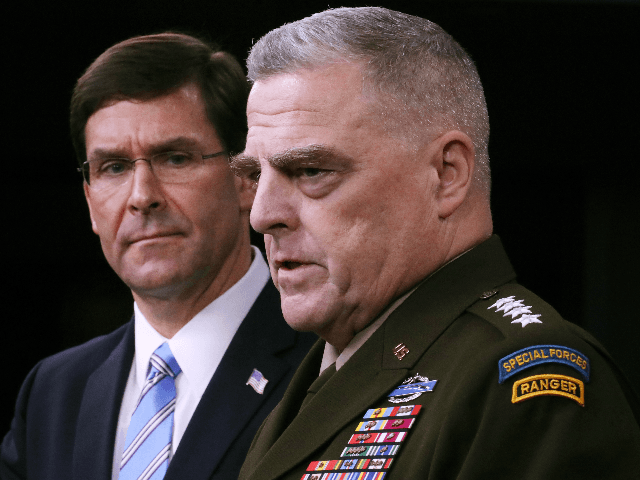The Pentagon confirmed Monday that the Islamic State terror chief’s remains were disposed of “appropriately” after his suicide to prevent capture this weekend. The rumored “burial at sea” was likely a significant departure from the Islamic burial al-Baghdadi would have preferred.
Chairman of the Joint Chiefs of Staff General Mark Milley told reporters, “Baghdadi’s remains were transported to a secure facility to confirm his identity with forensic DNA testing, and the disposal of his remains has been done and is complete and was handled appropriately.”
Several mainstream media outlets in the United States cited anonymous sources who claimed al-Baghdadi received a burial with “religious rights according to Islamic custom.” This is a somewhat curious declaration because U.S. policy toward ISIS since its rise to prominence during the Obama administration was entirely premised on the Islamic State having nothing to do with Islam, technically making Baghdadi a heretic who should not be afforded religious respect by any actual Muslim.
Furthermore, Islamic burial customs are difficult to reconcile with the grisly manner of Baghdadi’s death, since he reportedly blew himself to pieces with a suicide vest, killing three of his own children in the process and injuring a U.S. military canine.
As President Donald Trump put it, “there wasn’t much left” of the ISIS leader, and some of the remains were taken by U.S. forces for forensic study. Some reports stated Baghdadi’s head was recovered largely intact.
Islamic funeral traditions generally call for burial in the earth as quickly as possible after death, as close as possible to the place of demise. Many of the prescriptions for handling the corpse would be difficult or impossible to carry out for a person who killed himself with a suicide vest. The prayers intoned at the time of burial involve imploring Allah to forgive the dead and repeating the Muslim ritual of fealty to Allah, so they would logically have to be delivered by a practicing Muslim, if not necessarily a cleric.
Baghdadi was a Sunni Muslim from Iraq. His real name was Ibrahim Awad Ibrahim Ali al-Badri. His father was a scholar of Sunni Islam and Baghdadi followed suit. His family claimed to be descended from the same tribe as Mohammed, the founder of Islam, a crucial qualification for Baghdadi to declare himself “caliph,” the ruler of a pure Islamic kingdom. His pseudonym “Abu Bakr al-Baghdadi” is a callback to the first Islamic caliph after Mohammed, Abu Bakr. The title “caliph” essentially means “successor to Mohammed.”
Mohammed is said to have stipulated that he and his successors should be buried where they die, so Baghdadi’s alleged burial at sea would be seen as contrary to that tradition by those who accept the legitimacy of his claim to be a caliph.
False claims to the position of caliph are among the worst heresies in most branches of Islam. The legitimacy of an early caliph is the source of the great schism that has violently divided Sunni and Shia Islam for centuries. As it happens, Shiites recently completed the observance of a major holiday commemorating the murder of Mohammed’s grandson by a caliph they consider false.
The Islamic State enforces a version of strict Salafist Islam that firmly asserts tombs and shrines – in effect, any structure built over a grave – are forms of idolatry. ISIS is noted for aggressively desecrating tombs, including those regarded as sacred by other Sunni Muslims, and destroying mosques built over prominent gravesites. Earlier generations of Salafists even went as far as vandalizing shrines built over the graves of Mohammed’s family.
If this belief was adhered to in Baghdadi’s case, an appropriate burial would have involved internment in the earth close to where he died in a grave with only humble markers and no shrine or mosque built above it. Any U.S. concern about his grave becoming a “shrine” was still valid, however, as Islamic State fanatics would probably treat it as such even if no ostentatious structures were constructed above it.

COMMENTS
Please let us know if you're having issues with commenting.